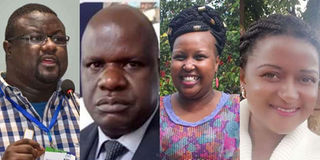
Doctors Hudson Alumera, Hudson Inyangala, Jackline Njoroge and Faith Mbabu.
What you need to know:
The medical fraternity will today convene a Special National Advisory Council meeting to deliberate on the welfare of the frontline medics as deaths of healthcare workers continue to be recorded.
The deaths among the medics have been blamed on the inability of public hospitals to deal with the increased number of Covid-19 patients. This has heightened the risk of infection due to the use of substandard protective equipment.
The Kenya Medical Practitioners Pharmacist and Dentists Union yesterday announced the loss of four members to the virus in just 24 hours.
“Today is a dark day for the medical fraternity, the death of four of colleagues in the last 24 hours is devastating news to the profession, we condole with the families of our departed colleagues and may their souls rest in peace,” said Dr Chibanzi Mwachonda, acting secretary-general.
Data from unions shows that about 800 doctors, 320 clinical officers and 600 nurses have so far been infected. Fifteen nurses and six doctors have died.
Others are severely ill and are admitted to intensive care units.
Dr Mwachonda listed the doctors as Emarah Ashraf, Hudson Alumera, Jackiline Njoroge and Faith Kanjiru Mbabu, bringing the total number of healthcare workers who have succumbed to the virus to 31 since the disease was first detected in March.
“KMPDU has convened a special meeting to deliberate on the way forward on the welfare, occupational, safety and health of all doctors in the country.
“All doctors are instructed not to risk their lives as per section 42 (2) of the Occupational Safety Health Act 2007 pending the resolution of the meeting,” he said.
“All doctors abstain from duties where the work environment is unsafe.”
Prof Lukoye Atwoli, Dean Aga Khan University Medical College, said yesterday Kenyans who still believe that Covid-19 is just flu are compromising the war on the disease. “Let’s protect ourselves. Let’s protect our loved ones. Let’s protect our healthcare workers,” he tweeted.
Shortage of experts
A Health ministry official, who sought anonymity, told the Sunday Nation: “How do you explain that your soldiers are falling in numbers every day, how are you going to fight the war if they are all down. This is the only chance he has to ensure that the healthcare workers are protected, give them enough and standard protection, release the risk allowances to motivate them and insure them for life. We have to do something. It is going to be tough when we are left alone.”
The death of the specialists is a big blow to Kenya, which is grappling with a shortage of experts in the health sector.
Kenya Medical Practitioners and Dentists Council CEO Daniel Yumbya admits the country has a problem with numbers. He says there are 9,096 Kenyan doctors licensed to take care of 47,564,296 Kenyans, of these, 2,591 were specialists, translating to one doctor for every 5,229 people.
Dr Yumbya adds that there are 228 foreign medics, who, when added to this, take the ratio to one doctor per 5,101 people -- way below the one doctor per 1,000 that the World Health Organisation (WHO) recommends
Dr Matshidiso Moeti, WHO Regional Director for Africa, said inadequate access to personal protective equipment or weak infection prevention and control measures raise the risk of health worker infection.
“Risks may also arise because of heavy workloads which result in fatigue, burnout and possibly not fully applying the standard operating procedures,” said Dr Moeti.
"One infection among health workers is one too many," said Dr Moeti. "Doctors, nurses and other health professionals are our mothers, brothers and sisters. They are helping to save lives endangered by Covid-19. We must make sure that they have the equipment, skills and information they need to keep themselves, their patients and colleagues safe."
Most counties are now approaching a critical number of infections that can place stress on health systems, a sign of the challenges medical staff on the frontlines of the outbreak face.
Last week, the number of patients who were critically ill ranged between 50 to 60 with more than 70 others in need of life support.
On Friday, more than 147 patients were critically ill, with 54 in ICU and 93 in oxygen support.
Facilities overwhelmed
National Nurses Association of Kenya (NNAK) president Alfred Obengo and Kenya National Union of Nurses deputy secretary-general Maurice Opetu said health facilities are overwhelmed, with just a few personnel left to attend to all the patients while using substandard personal protective equipment.
"We will definitely succumb to the virus if we are to continue working in such conditions," Mr Opetu said.
Healthcare workers in several counties have downed their tools protesting the lack of protective gear. The Ministry of Health has given the Kenya Medical Supplies Authority the greenlight to dish out the PPE that have been lying at its warehouse for eight months now. Mr Opetu told the Saturday Nation that with no risk allowance and life insurance, health workers are demoralised.
"When you are infected, you need to cough up money for treatment; there is no risk allowance for the past five months, yet we are attending to Covid-19 patients. No life insurance yet we are dying and leaving our loved ones with nothing," Mr Opetu said.
"We have for the last months doubted the quality of the locally produced masks. And even with the quality issues, the supply is erratic," he added.
aoketch@ke.nationmedia.com





No comments :
Post a Comment